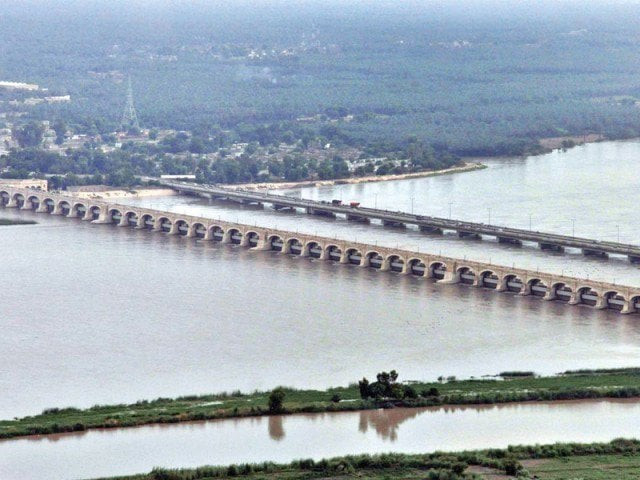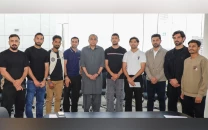Water disputes: World Bank halts Indo-Pak arbitration – for now
Says move will allow two countries to consider alternative ways to resolve their disagreements

The experts suggest commissioning specific research to end disputed data. PHOTO: FILE
“The World Bank Group today announced a pause in the separate processes initiated by India and Pakistan under the Indus Waters Treaty (IWT) to allow the two countries to consider alternative ways to resolve their disagreements,” said an official handout issued by the local office of the Washington-based lending agency.
Adviser to Prime Minister on Foreign Affairs Sartaj Aziz said Pakistan’s foreign office would issue a statement after reviewing the World Bank’s press release. Pakistan’s Indus Water Commissioner Asif Baig also declined to comment.
The global lender said the announcement temporarily halts the appointment of a neutral expert, as requested by India, and the Chairman of the Court of Arbitration, as requested by Pakistan, to resolve issues regarding two hydroelectric power plants under construction by India along the Indus rivers system.
Both processes initiated by the respective countries were advancing at the same time, creating a risk of contradictory outcomes that could potentially endanger the treaty, said the handout.
Pakistan had disputed India’s move to construct two power plants – the 330-megawatt Kishanganga hydropower plant and 850-megawatt Ratle hydroelectric power plant. The power plants are being built by India on the Kishanganga and Chenab rivers respectively.
It is for the first time since the IWT became operational some 56 years ago that the WB has halted the arbitration process. The WB has earlier played the role of mediator in case of Kishganga project when Pakistan raised the legal issues and Baglihar project.
India has recently raised temperatures after it revealed its intentions to block waters flowing into Pakistan. Islamabad has taken an exception to the Indian designs, saying any such move will be taken as open aggression.

“We are announcing this pause to protect the IWT and to help India and Pakistan consider alternative approaches to resolving conflicting interests under the treaty and its application to two hydroelectric power plants,” said World Bank Group President Jim Yong Kim.
He said this was an opportunity for the two countries to begin to resolve the issues in an amicable manner and in line with the spirit of the treaty rather than pursuing concurrent processes that could make the treaty unworkable over time.
“I would hope that the two countries will come to an agreement by the end of January,” said the group president. The WB announced the pause the day it was supposed to appoint the Chairman for the Court of Arbitration or the Neutral Expert.
“The WB took the decision under pressure of India and Pakistan has been trapped into it,” said Jamat Ali Shah, former Indus Commissioner of Pakistan. He said the WB paused the process only after Pakistan explicitly gave an understanding of following other mechanisms to resolve the disputes.
Shah said Pakistan had first applied to the WB for appointment of Chairman of the Court of Arbitration, therefore, the WB should not have accepted India’s request for appointment of neutral expert.
“The WB’s decision to follow two parallel processes in a single dispute is a bizarre move, which subsequently allowed India to denounce that it would not accept court of arbitration,” Shah said.
He said that under the 1960 Indus Basin Treaty, the only other option was taking up the matter at the Permanent Indus Commission level. Both the countries have already exhausted this option and availing it again would not resolve the disputes, said the former official.
He said during this time India would make significant progress on both the projects.
In November this year, India had refused to take part in the Court of Arbitration established by World Bank to solve the Kishanganga dispute with Pakistan, stating that it was legally untenable to set up two parallel dispute mechanisms. The Ministry of External Affairs spokesperson Vikas Swarup had said India could not be party to actions which were not in accordance with the IWT.
The WB said the IWT 1960 is seen as one of the most successful international treaties and has withstood frequent tensions between India and Pakistan, including conflicts.
The treaty sets out a mechanism for cooperation and information exchange between the two countries regarding their use of the rivers, known as the Permanent Indus Commission, which includes a commissioner from each of the two countries.
“As an international financial cooperative that has the mandate to act in the interests of all its shareholders, the bank will always remain supportive of the development goals of both countries,” said the WB’s Washington-based spokesman Alexander Ferguson.
He was responding to a question whether WB has accepted India’s position by pausing the process. Ferguson did not give a clear answer to another question about future line of action if both the countries do not reach to an agreement by January.
“The announcement is consistent with the WB’s historic role as a neutral, pragmatic and proactive partner to both countries and is without prejudice to the processes initiated by [them],” he said.
Published in The Express Tribune, December 14th, 2016.



1733130350-0/Untitled-design-(76)1733130350-0-208x130.webp)















COMMENTS
Comments are moderated and generally will be posted if they are on-topic and not abusive.
For more information, please see our Comments FAQ